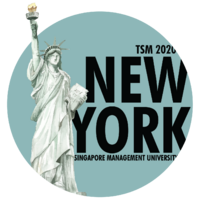Difference between revisions of "1920T2 New York City/Reflection"
Jump to navigation
Jump to search
Benjamingan (talk | contribs) |
Benjamingan (talk | contribs) |
||
| (One intermediate revision by the same user not shown) | |||
| Line 26: | Line 26: | ||
--> | --> | ||
#Key takeaways (1) or learning points from the project | #Key takeaways (1) or learning points from the project | ||
| − | # | + | #Key takeaways (1) or learning points from the course |
#Keep to one sentence for the course and one sentence for the project | #Keep to one sentence for the course and one sentence for the project | ||
| Line 35: | Line 35: | ||
When in doubt, students should consult the instructors of the course. Details on the SMU Code of Academic Integrity may be accessed at http://www.smuscd.org/resources.html. | When in doubt, students should consult the instructors of the course. Details on the SMU Code of Academic Integrity may be accessed at http://www.smuscd.org/resources.html. | ||
| − | |||
| − | |||
</div> | </div> | ||
Latest revision as of 14:31, 23 March 2020
| HOME | | COURSE | | ITINERARY | | ROLE | | TEAM | | ORGANIZATION | | REFLECTION |
Guidelines for Reflections
Reflection on your trip visit (Due to Covid-19, we did not visit the organizations.)
- Key takeaways (1) or learning points from the project
- Key takeaways (1) or learning points from the course
- Keep to one sentence for the course and one sentence for the project
Academic Integrity
All acts of academic dishonesty (including, but not limited to, plagiarism, cheating, fabrication, facilitation of acts of academic dishonesty by others, unauthorized possession of exam questions, or tampering with the academic work of other students) are serious offences. All work (whether oral or written) submitted for purposes of assessment must be the student’s own work. Penalties for violation of the policy range from zero marks for the component assessment to expulsion, depending on the nature of the offense.
When in doubt, students should consult the instructors of the course. Details on the SMU Code of Academic Integrity may be accessed at http://www.smuscd.org/resources.html.

